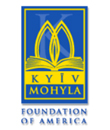Featured Galleries USUBC COLLECTION OF OVER 160 UKRAINE HISTORIC NEWS PHOTOGRAPHS 1918-1997
 Holodomor Posters
Holodomor Posters

WALKING THE ROPE: UKRAINE’S BALANCING ACT BETWEEN EU AND EURASIA
 Kyiv Mohyla Foundation, Kyiv, Ukraine, 19, May 2012
Kyiv Mohyla Foundation, Kyiv, Ukraine, 19, May 2012
27 August – 9 September 2012
 Since its independence 20 years ago, Ukraine developed a stronger co-operation with the West and the EU, but also never lost its ties to Russia. While important events seemed to change the path towards one or the other direction – namely the Orange Revolution in 2004 - Kyiv’s orientation is still to both sides. It tries to negotiate an association and free trade agreement with Brussels while, at the same time, entering a post-Soviet free trade zone and considering Moscow's project of a Eurasian Union. How can one explain these balancing acts? Which were the critical transformations and events that determined the way in which Ukraine developed? What is specific for the Ukrainian culture and state, and where can we find typical traits of a post-Soviet society?
Since its independence 20 years ago, Ukraine developed a stronger co-operation with the West and the EU, but also never lost its ties to Russia. While important events seemed to change the path towards one or the other direction – namely the Orange Revolution in 2004 - Kyiv’s orientation is still to both sides. It tries to negotiate an association and free trade agreement with Brussels while, at the same time, entering a post-Soviet free trade zone and considering Moscow's project of a Eurasian Union. How can one explain these balancing acts? Which were the critical transformations and events that determined the way in which Ukraine developed? What is specific for the Ukrainian culture and state, and where can we find typical traits of a post-Soviet society?
The summer school will introduce students to the analysis of these phenomena from different perspectives as the teaching will involve English-speaking political scientists, historians, economists, cultural scientists, and sociologists – mainly, but not only from National University of "Kyiv-Mohyla Academy".
Topics include:
- Ukraine between Democracy and Authoritarianism
- The Origins of the Orange Revolution, and What Remains of It
- Ukraine’s Relationship to the European Union & Russia
- The Transformation of Ukrainian Society in Comparative Perspective
- Ukraine's Economy and the World Financial Crisis
- Ukraine's Coming to Term with Its Past
- Ukraine's Post-Soviet Cultural Life, Social Change and Modernization Since 1991
- Ukraine and the Question of Gender Equality
- Ukraine and the Challenge of Ecological Change Including the Issue of Chernobyl
For more information about requirements and registration click on:
http://www.dfc.ukma.kiev.ua/coming-to-naukma/international-summer-programs/walking-the-rope-ukraine-balancing-act-between-europe-and-eurasia











